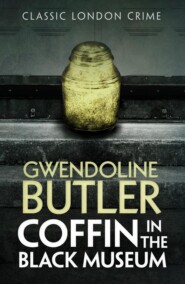По всем вопросам обращайтесь на: info@litportal.ru
(©) 2003-2024.
✖
Coffin in Fashion
Автор
Год написания книги
2018
Настройки чтения
Размер шрифта
Высота строк
Поля
Sometimes, at bad moments, she thought he liked her new motorcar, the Porsche, more than her, and that if anything happened to her, he would find it a good mother substitute. She had caught him sitting at the wheel, playing with the gears. He’d even tried to drive it away.
In anger, she’d hit him, and then was ashamed because you should never hit your child. So she’d promised to give him driving lessons, on the quiet, when no one could see. But the anger was still there between them, this time it had transferred itself to him. It came out in the way he held the wheel, as if the car was his anger and his weapon. This frightened her. So she’d dropped the driving instruction. It was illegal, anyway.
At that moment, the end of her working day, the day after Gabriel’s photo session, her mind was about equally divided between Gabriel, whom she knew to be a problem but did not yet know how big a one, and Steve. Here again, was he a real problem or just a tiny little one that she had let get out of hand?
One day, she thought, he will walk out of this house and I will never see him again. Fourteen years old and already she felt she was writing his obituary. Only underground boys like Steve did not have obituaries, they just wandered off and one day there was a tiny paragraph in the daily paper about a boy being found. Or perhaps not even that. Just silence for evermore. But silence was what she had now.
One day she might find out why he hated her, if that was what it was, and not some family sickness to which she might one day succumb herself. But no, the bad blood was on his father’s side of the family.
At this moment she had a letter in her desk from Steve’s teacher praising his dramatic ability and suggesting he ought to go to theatre school. Rose thought she knew all about his dramatic powers, having been only too often a reluctant witness.
Although he would not talk to her, Steve had no intention of going short of his needs and he could mime. He could get across what he wanted all right and Rose never had any difficulty in being convinced he meant it. She wondered if he really wanted to go to drama school? So far he had made no such signal to her, which probably indicated he had no such intention. On the other hand, sometimes he liked to keep her in the dark until the last possible moment.
Small wonder that with such a training in body language she had no difficulty in reading Gabriel’s mind: she knew that Gabriel was keeping something from her, could make a pretty good guess what it was and did not, in spite of what Gabriel might think, even mind very much. She had a simple philosophy of all being fair … and the rag trade was a kind of war. She even liked Gabriel, but that didn’t mean she would let her get away with anything. Far, far from it.
‘I’ll kill that girl if she really screws me up.’
She was older than Gabriel, but not as much older as Gabriel thought. Nevertheless, in her career she had seen a good many Gabriels come and go. Some had more talent than others and stayed the course better. Character came into it too, you needed toughness in this trade. Gabriel was one of the smartest and the most talented. Perhaps the most talented. Rose respected that talent even while she knew very well that Gabriel would not stay with her for ever, or even for much longer. But while she was under contract, Rose meant her to abide by it.
Unluckily, she herself had no creative talent worth talking of. She had a good head for business combined with an intuitive grasp of what the market wanted. In other words, she understood fashion as interpreter. She needed someone like Gabriel and meant to hang on to her if she could. Usually she was content to let her young designers drift away; few of them were heard of again. Perhaps contact with Rose Hilaire had sucked them dry. But in the case of Gabriel she could foresee a long and profitable relationship, if not a particularly happy one. If Gabriel examined the small print of her contract she could see that Rose had allowed herself a ten-year option on her services.
Now she said: ‘I don’t trust her, Dagmar, but thanks all the same.’
Dagmar Blond buttoned her coat. ‘How long have we known each other?’
Rose did not answer because she knew from experience that Dagmar was about to tell her.
‘I worked for your aunt when she was running the business, and I was with your grandfather before that, God rest his soul.’
Grandfather Hilaire’s soul received frequent benedictions from Dagmar Blond who found him a useful seal of approval, although in life she had been no more than an errand girl in his workshop whose face he barely knew. Still, it proved she went a long way back with Rose.
‘So we inherited each other.’ Rose remained good-humoured. ‘And if I remember right, Gabriel came with an introduction from you.’
‘All right, all right. She came from Paradise Street. That ought to have told you something.’
Paradise Street was a short, crowded street running between Mouncy Street and Rowley Road, near the railway station and hard by the factory. It was famous for the close-knit family groups which lived there. Famous also for living by their own rules, and being well known to the police.
‘So did we once,’ said Rose Hilaire, ‘and we’ve moved away. That girl will be going a long way from Paradise Street.’
But they both knew you never got Paradise Street out of your system, it was there for always, something you were born to, like a crown or an inherited disease.
It said something about you when you said you came from Paradise Street. It had a past and a history, had Paradise Street, and they both projected themselves into the future. Strange violent things had happened there and were suppressed by the inhabitants: it was their business, other people could only guess.
‘I can manage her,’ Rose repeated.
‘And what about Joe?’
‘Joe?’
‘Yes. Joseph Benedict Landau,’ said Dagmar. ‘Can you manage him?’
‘Leave Joe out of it.’ Rose did not like to hear Dagmar talk about Joe; he was private.
She and Gabriel represented opposing poles in fashion but Rose was old enough to know that in the end they might complement each other. Even in looks they were different: Gabriel, beside being still very young, was slight, small-boned like a bird, and with dark eyes and a flow of dark hair, which at the moment, she ironed straight every morning. To those who said she might be bald at forty as a consequence she said either that she did not expect to live that long or else that she would buy a wig. Already she owned two falls of hair which she wore on an Alice band. Rose was tall, full of bust and narrow of waist, with a round face and strong curly blonde hair. Like Gabriel, she had a wardrobe of wigs. On her they never looked quite natural.
She looked at the clock on her desk, a round black face set in a crystal block, one of her first presents to herself when she began to make money. The factory was closing down, emptying for the night, but she often worked late, telephoning round her branches or to various contacts in the fashion trade. It was her time for keeping in touch with movements in her world.
But she also liked to be home to greet Steve when he came in from school. He came as near as he ever did to talking to her then. Anyway, it was the time that messages passed back and forth between them.
Because she wanted to stay in the neighbourhood from which she sprang, a desire reinforced by her wish to give a strong background to Steve, she had moved to a flat in a new block overlooking the river not far from Mouncy Street. She could walk there in ten minutes, but she drove in her Porsche. She was a slow and cautious driver, causing both alarm and irritation to other drivers by her handling of her fast car.
She wanted to get home but she also had several business matters she needed to check up on, not least of which was the possible destination of the portfolio of designs she imagined that Gabriel was creating. You couldn’t keep that sort of thing secret in the relatively tight world they lived in. Only as youthful an operator as Gabriel would have expected to.
On looking the field over, it seemed to Rose that there were two candidates: on the one hand there was the old-established firm of Senlis Styles which was seeking (and rightly so in Rose’s opinion) to change its image. On the other hand there was the small and thrusting new firm of Lizzie Dreamer whose super-active boss, a stout young man called Touch, was busy scooping up all the new talent available.
Rose herself had had a brush or two with Teddy Touch and almost wished Gabriel joy of him, but this was a weakness she could not allow herself. You hung on to what you had and you never let go, that was her style.
Then the telephone rang on her desk, not the red one that was entirely office and work, but the blue one which was her private number. Only family and friends used it.
‘Hello. Is that you?’
A young, gruff voice, she knew it at once, even though it was so rarely used for her.
‘Steve, what is it? Why are you calling?’
‘Well …’ A hesitation, a fumbling for words. Was it that he could not speak, or would not? ‘Just to say – that something bad has happened.’
‘Steve … Please … What is it?’ She was almost shouting.
The telephone was removed from his hand, and another voice spoke. A woman’s voice, educated, gentle but with a hint of command and a slight Scottish accent. ‘Miss Fraser speaking …’ Steve’s headmistress at Hook Road School.
‘Yes, I know.’
‘Can you come round, Mrs Hilaire? At once? I think it would be best. There is something you have to be told.’
It seemed to Rose Hilaire that she could hear other voices in the background. Another woman and perhaps a man.
Yes, certainly a man, and why not, in a school? But all the same she didn’t like the sound of it at all.
Before she left, she picked up her blue phone. ‘Joe? I’m sorry, darling. Tonight’s not on. Trouble here.’ Hook Road School had lately undergone a face-lift. As cosmetic surgery, it was minor and superficial, designed as is usually the case with such surgery to raise the spirits rather than change the character. Old woodwork had been replaced with newer structures, strip lighting had taken the place of glass globes hanging from the ceiling. Pale turquoise paint had replaced the steady old green paint of the old days. A new heating system boosted the temperature so that some rooms were uncomfortably warm, though the lavatories and washrooms for both staff and children were as chilly and damp as ever. Within the next decade the buildings were due to be demolished to give place to a glittering new place of stone and glass. The staff had seen pictures of it and were profoundly uneasy.
But for the moment Hook Road School was much as it had been when the Victorian School Board of Governors devised its architecture and meant it to last. As indeed it had done, through two world wars, Zeppelin raids and the Blitz. The ghosts of the old pupils (who still seemed to hang about in the smells and noises) would have felt quite at home.
There was a piano being played somewhere in the building; there had always been a piano being played.
Miss Fraser shut the door against the noise. She was young for a headmistress, and as tough as her job demanded, which was tough enough. She gave the impression of having an active and vital life outside school. Otherwise she was fond of children and good-humoured. But today she looked tense and preoccupied, as if underneath she was frightened.
In the room with her was a bearded man, sitting down, a uniformed policewoman, standing up, and Steve Hilaire who was half sitting, half crouched on a hard chair, beside him his sports bag.











